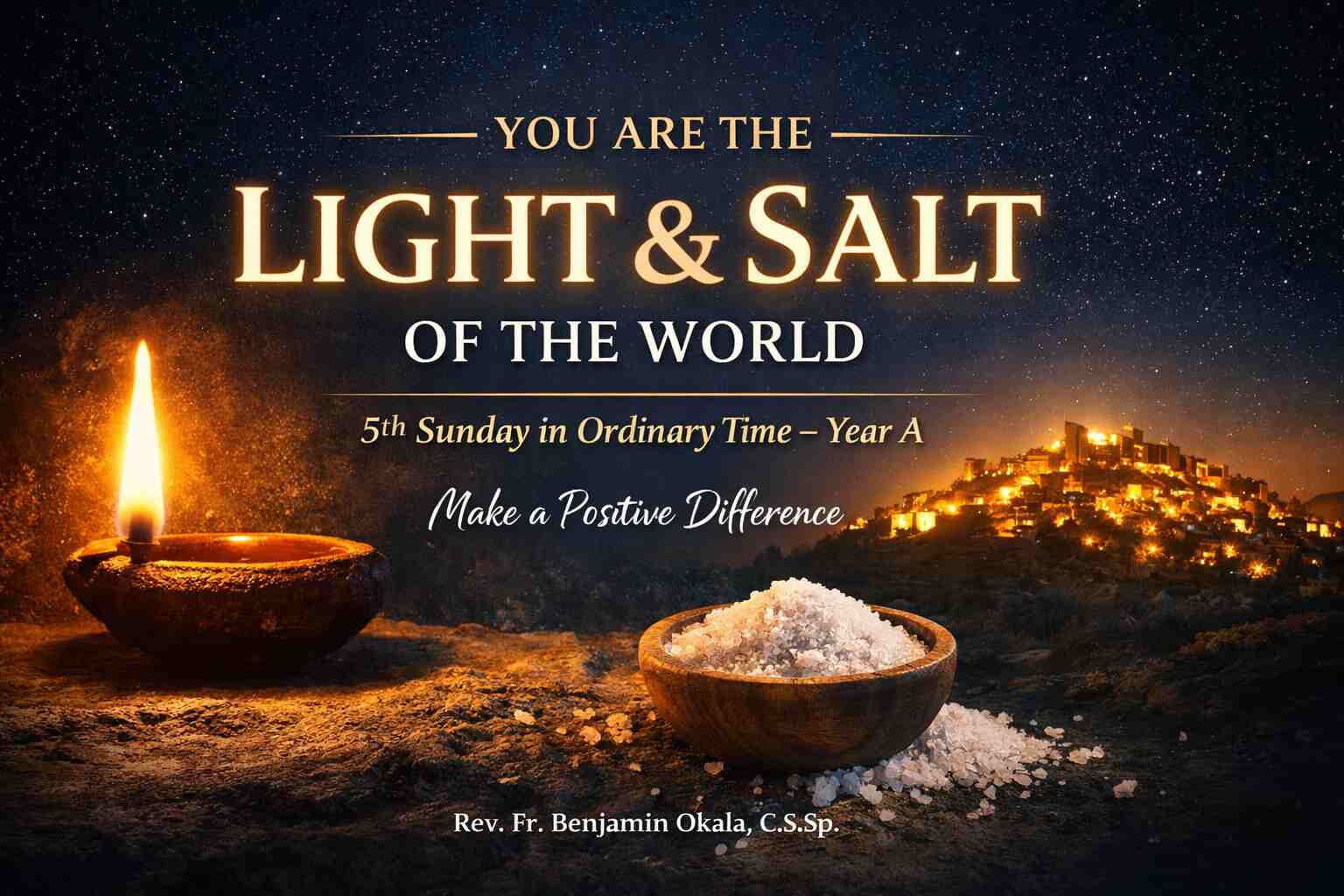Homily of 5th Sunday of Easter, Year B
First Reading: (Acts 9:26–31); Second Reading: (1 John 3:1–24); Gospel (John 15:1–8)
Have you ever felt like a withered branch, struggling to produce anything of value in your life? Have you ever questioned your purpose, wondering if you are making a real difference in society? In the symphony of life, where faith and productivity intertwine, we discover a profound truth. This truth holds that, real productivity blossoms from the fertile soil of our spiritual connection with God, bearing good fruit that contributes to the growth and development of our society.
The gospel of John uses the powerful metaphor of Jesus Christ as the “True Vine,” and we, the branches, drawing life and sustenance from Him. This metaphor speaks to the very essence of our Christian identity and purpose: to bear good fruit for the common good. In this homily, we will reflect on the power of productivity and how our seemingly barren branches can become catalysts for fruitfulness.
THE RELATIONSHIP OF VINE AND BRANCHES

In the gospel reading, Jesus Christ says, “I am the vine; you are the branches. Whoever remains in me and I in him will bear much fruit. Because without me you can do nothing.” (John 15:5). This image of vine and branches used by Jesus Christ in this context can be clearly understood through agricultural perspectives. In the ancient world, the vine was a vital crop, requiring careful cultivation and pruning to produce fruit. This agricultural context adds depth to the metaphor, highlighting the need for dependence and care.
Moreover, every living organism needs a source of nourishment in order to stay alive. When the organism cut off from the source of nourishment, it will first begin to emaciate and eventually die. For instance, the channel that the branches of every plant get their nourishment is through the root and stem. If a branch detaches itself from the root and the stem, it withers rapidly and dies. Of course, its productive life cycle will be terminated, and it no longer bears fruit. This is exactly what happens to us whenever we detach from Jesus Christ, the source of our existence (Acts 17:28).
SIGNIFICANCE OF VINE AND BRANCH METAPHOR

The parable of the vine and the branches has been a source of comfort and inspiration for Christians throughout history. This metaphor underscores the vital connection between Jesus Christ and His followers. It illustrates the importance of dependence on Him for productivity. Jesus Christ is the true vine, the source of life and nourishment for His followers. Of course, the branches represent all who believe in Jesus Christ. The fruit symbolizes productivity: good works, love, righteousness, compassion, forgiveness, good governance, etc. Just as a branch cannot bear fruit on its own, so too, Christians cannot live a fruitful life apart from Jesus.
Besides, the pruning process of the branch represents the challenges and trials that Christians may face. These experiences, though difficult, serve to refine and strengthen our faith, ultimately leading to greater productivity. But when we remain attached to Jesus Christ through prayer, sacraments, and living according to His teachings, we receive the Holy Spirit, the lifeblood that enables us to bear good fruit. These are the qualities that demonstrate a genuine connection to Jesus Christ and a life lived in accordance with His teachings.
CONVERSION OF SAUL: A CATALYST FOR SPIRITUAL PRODUCTIVITY

The story of Saul’s conversion in the first reading serves as a catalyst for spiritual productivity. His conversion is a powerful example of the transformative power of attachment to Jesus Christ. Before his encounter with the risen Lord, Saul, driven by religious zeal but lacking the guidance of the Holy Spirit, was actively persecuting the early Church. His actions were destructive, bearing the bitter fruit of division and hatred.
However, Saul’s life underwent a dramatic transformation upon encountering Jesus Christ. Subsequently, after his baptism, his name changed from Saul to Paul (Acts 9:1–28). Filled with the Holy Spirit, he dedicated himself to the tireless mission of spreading the gospel. His conversion from persecutor to apostle marked a pivotal moment in Christian history, and his letters became foundational texts for the faith. Of course, he was a major catalyst for spiritual productivity in the world. He planted the seeds of faith that have blossomed into the global Christian community we see today.
ATTACHMENT TO CHRIST: A CATALYST FOR TRANSFORMATION AND TRUE PRODUCTIVITY

In a world that yearns for change, Jesus Christ emerges as a beacon of hope. His invitation to connect with Him, the “True Vine,” unlocks a transformative potential within us, empowering us to bear fruit that nourishes our communities, strengthens our relationships, and leaves a legacy of love and hope. This connection, exemplified by St. Paul’s remarkable transformation, demonstrates the power of Christ to change hearts, turning destructive forces into instruments of love, peace, and true productivity.
This transformation manifests in various ways, which impacts positively on personal, societal, and professional spheres. On a personal level, attachment to Christ fosters inner peace, resilience, and a deeper sense of purpose. Socially, it inspires acts of compassion, justice, and service, contributing to a more harmonious and equitable world. Professionally, it fuels creativity, innovation, and a commitment to excellence, leading to advancements in various fields and industries. These transformations, while rooted in individual encounters with Christ, ripple outward, impacting communities, institutions, and the broader society.
DETACHMENT FROM JESUS CHRIST LEADS TO PERDITION

In our contemporary world, characterized by rapid technological advancements and a focus on material pursuits, detachment from Jesus Christ presents a significant risk. It has dire consequences for individuals, communities, and society as a whole. It is a dangerous path that leads to spiritual emptiness, a loss of purpose, and eternal separation. Of course, the absence of a transcendent purpose can fuel a relentless pursuit of self-gratification, contributing to addiction, depression, and alienation. Our actions may appear good on the surface, but they will ultimately be fruitless and clandestinely destructive.
Furthermore, detachment from Christ can manifest in the erosion of traditional values, leading to a loss of moral guidance and a sense of emptiness. This engenders self-sufficiency and a focus on worldly pursuits rather than spiritual growth. Also, it contributes to a culture of apathy and despair, hindering collective efforts to address pressing social and environmental challenges. Consequently, this weakens social bonds, leading to selfishness, greed, hatred, increased conflict, and a decline in civic engagement.
HOW TO REMAIN CONNECTED TO JESUS CHRIST FOR GREATER PRODUCTIVITY
Staying connected to Jesus Christ and tapping His grace are essential for greater productivity. Here are some ways to deepen our connection with Jesus Christ and experience the transformative power of His grace.
1. PRAYER AND SCRIPTURE READING

a. Regular Prayer: According to the Catechism of the Catholic Church, “Prayer is the raising of one’s mind and heart to God or the requesting of good things from God” (CCC, 2559). Devoting time each day to prayer, whether through formal prayers, spontaneous conversations with God, or simply sitting in quiet reflection, is very important. This allows us to open our hearts to God’s presence and receive his guidance and strength.

b. Scripture Reading: Studying the Bible and meditating on Christ’s teachings may seem inconsequential, but they have a tremendous power to transform us. In fact, the Scripture provides insights into God’s character, His will for our lives, and the path to true productivity. By studying the Bible, we allow God’s Word to shape our thoughts, actions, and desires.
2. SACRAMENTS

a. Holy Eucharist: Participating in the Eucharistic celebration regularly connects us with God and all the saints. This sacrament allows us to receive the body and blood of Jesus Christ, which has the power to detoxify us spiritually. Thus, we deepen our union with Him, drawing upon His life-giving grace.

b. Frequent Confession: Frequent confession serves as a catalyst for our spiritual growth and productivity. This sacrament offers forgiveness for our sins and the opportunity to experience God’s healing and mercy. By seeking forgiveness, we cleanse our hearts and open ourselves more fully to God’s grace. This fosters self-awareness, humility, and the courage to love one another sincerely.
3. CHARITY: A CATALYST FOR SOCIETAL PRODUCTIVITY

Charity is one of the religious practices emphasized by Christ that can lead us to eternal life (Matthew 25:31–40). This fosters virtues such as love, compassion, kindness, generosity, empathy, etc., serving as catalysts for moral and ethical development. It unifies communities and reflects the interconnected nature of human existence, laying the groundwork for enhanced societal productivity. Charity’s transformative power extends beyond material assistance and fosters holistic productivity.
St. John exhorts us in the second reading, “Little children, let us not love in word or speech but indeed and truth” (1 John 3:1). We are not Christians who only build skyscrapers with their mouths when talking about charity, but no action (James 2:14–17). Rather, we should practically engage in charity works daily, not only to our friends who may pay us back, but to strangers. This will foster unity as well as contribute to the well-being of society at large.
4. PERSONAL REFLECTION

a. Daily Examen: Taking time each day to reflect on our thoughts, words, and actions can enhance our productivity. This allows us to identify areas where we can grow closer to God and become more productive in our daily lives.
b. Spiritual Direction: Seeking guidance from a spiritual director or mentor who can offer support and insights on your spiritual journey can be of great help.
Remarkably, true productivity is not just about accomplishing tasks but about living a life that is aligned with God’s will and purpose. By remaining connected to Jesus Christ and tapping His grace, we become more productive individuals, bearing fruit that contributes to the flourishing of our communities, which will last for eternity.
CONCLUSION
From the foregoing, we are called to be productive Christians, and to bear good fruit for our communities. This fruitfulness comes through our connection to Jesus Christ, the true vine, and our lives lived in His love. As branches, we draw sustenance from Him, experiencing a transformation that mirrors the remarkable conversion of Saul to Paul. This transformation impacts our personal, societal, and professional spheres. It fosters inner peace, inspires compassion, and engenders creativity that leads to massive productivity. We may pass through difficulties as a result of pruning, but the love of God will always overshadow us (John 15:2).
However, detachment from Christ leads to emptiness and a loss of purpose. It erodes values, weakens bonds, hinders progress, and may lead one to eternal damnation. But once we attach ourselves to the vine, the Holy Spirit empowers us to be productive branches. Yes, we become channels of God’s grace, bearing the fruits of the Spirit for the glory of God and the good of all (Galatians 5:22–23). Therefore, let us remain steadfast in our connection with Jesus Christ, tapping His grace through prayer, scripture, and sacraments. By so doing, we become more productive, bearing fruits that will build a just and flourishing society, as well as leaving a legacy of love that will last for eternity.
PRAYER:
† Almighty God, our Father, I come before you seeking your grace and guidance for those reading this reflection. Help them to remain connected to Jesus Christ, the “True Vine”, drawing strength from Him for greater productivity. Strengthen them to be channels of your grace, bearing the fruits of the Spirit for the glory of God and for common good.
May the Holy Spirit help you to remain steadfast in good works, and bless all your endeavours, through Jesus Christ our Lord, Amen.†
Peace of Christ be with you.
Rev. Fr. Benjamin Okala, C.S.Sp.



